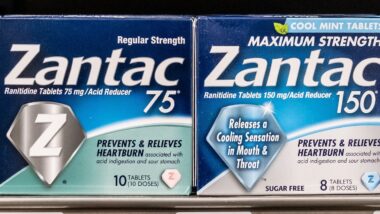
Contracting Stevens-Johnson syndrome is a serious problem for any patient. It is important that patients know what medications cause SJS so that they can be aware of the risks.
What is SJS?
Stevens-Johnson syndrome, or SJS, is a rare disorder that begins with flu-like symptoms. When a patient first develops Stevens-Johnson syndrome, he or she may think that he or she has caught the flu.
The patient then develops a rash over a large part of the body, and large blisters form. Essentially, SJS causes cell death during which the epidermis separates from the dermis. The large lesions cause the skin to slough off in large pieces exposing the patient to infection and scarring.
Stevens-Johnson syndrome also attacks the mucous membranes of the body. It can cause corneal blisters, corneal holes and in some cases permanent vision loss. It can also affect the mouth and other mucous membranes on a patient’s body.
When Stevens-Johnson syndrome covers large portions of the body, it can lead to a condition called toxic epidermal necrolysis, or TEN. Both SJS and TEN are highly dangerous and can lead to death.
Stevens-Johnson syndrome and toxic epidermal necrolysis should be treated immediately when diagnosed. Treatment for SJS or TEN often occurs in a hospital’s burn ward. Recovery can take a long time, often lasting up to several months.
What medications cause SJS?
Even though Stevens-Johnson syndrome is very rare, it is almost always preceded by the ingestion of a drug that has been known to trigger the condition. Many times, SJS does not occur until one to two weeks after first using the medication.
Many medications cause SJS. NSAIDs are often the culprit of the condition. An NSAID is a non-steroidal anti-inflammatory drug. Common NSAIDs are aspirin, ibuprofen and naproxen. Advil and Motrin have both been associated with Stevens-Johnson syndrome.
Anticonvulsants used to treat seizures and antipsychotics used to treat mental illnesses have been linked to SJS.
Antibiotics such as fluoroquinolones can also cause SJS. A common medication in this drug class is ciproflaxin. Ciproflaxin is a common antibiotic that is prescribed to treat urinary tract infections and kidney infections.
Azithromycin, also known as Zithromax, belongs to a drug class called macrolide antibiotics. Azithromycin has been known to trigger SJS in patients as well. Antibacterial sulfonamides such as sulfasalazine may also lead to SJS.
Zyloprim, a uric acid reducer that is used to treat gout and kidney stones, is also a known trigger of Stevens-Johnson syndrome.
Patients should be aware what medications cause SJS so they can begin treatment of SJS or TEN right away if they begin to show symptoms. If patients wonder what other medications cause SJS, they can consult their doctor.
Do YOU have a legal claim? Fill out the form on this page now for a free, immediate, and confidential case evaluation. The Stevens Johnson Syndrome attorneys who work with Top Class Actions will contact you if you qualify to let you know if an individual lawsuit or class action lawsuit is best for you. [In general, SJS lawsuits are filed individually by each plaintiff and are not class actions.] Hurry — statutes of limitations may apply.
ATTORNEY ADVERTISING
Top Class Actions is a Proud Member of the American Bar Association
LEGAL INFORMATION IS NOT LEGAL ADVICE
Top Class Actions Legal Statement
©2008 – 2026 Top Class Actions® LLC
Various Trademarks held by their respective owners
This website is not intended for viewing or usage by European Union citizens.
Get Help – It’s Free
Help for Victims of Stevens Johnson Syndrome
If you or a loved one were diagnosed with Stevens Johnson Syndrome (SJS) or toxic epidermal necrolysis (TEN) after taking a prescribed or over-the-counter medication, you may be eligible to take legal action against the drug’s manufacturer. Filing an SJS lawsuit or class action lawsuit may help you obtain compensation for medical bills, pain and suffering, and other damages. Obtain a free and confidential review of your case by filling out the form below.
An attorney will contact you if you qualify to discuss the details of your potential case at no charge to you.
Please Note: If you want to participate in this investigation, it is imperative that you reply to the law firm if they call or email you. Failing to do so may result in you not getting signed up as a client, if you qualify, or getting you dropped as a client.
Oops! We could not locate your form.












